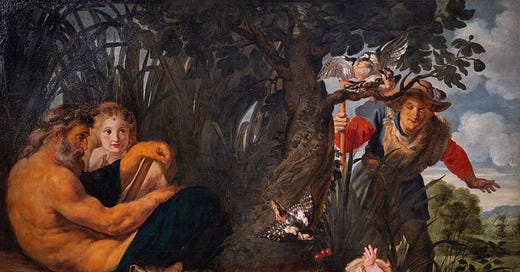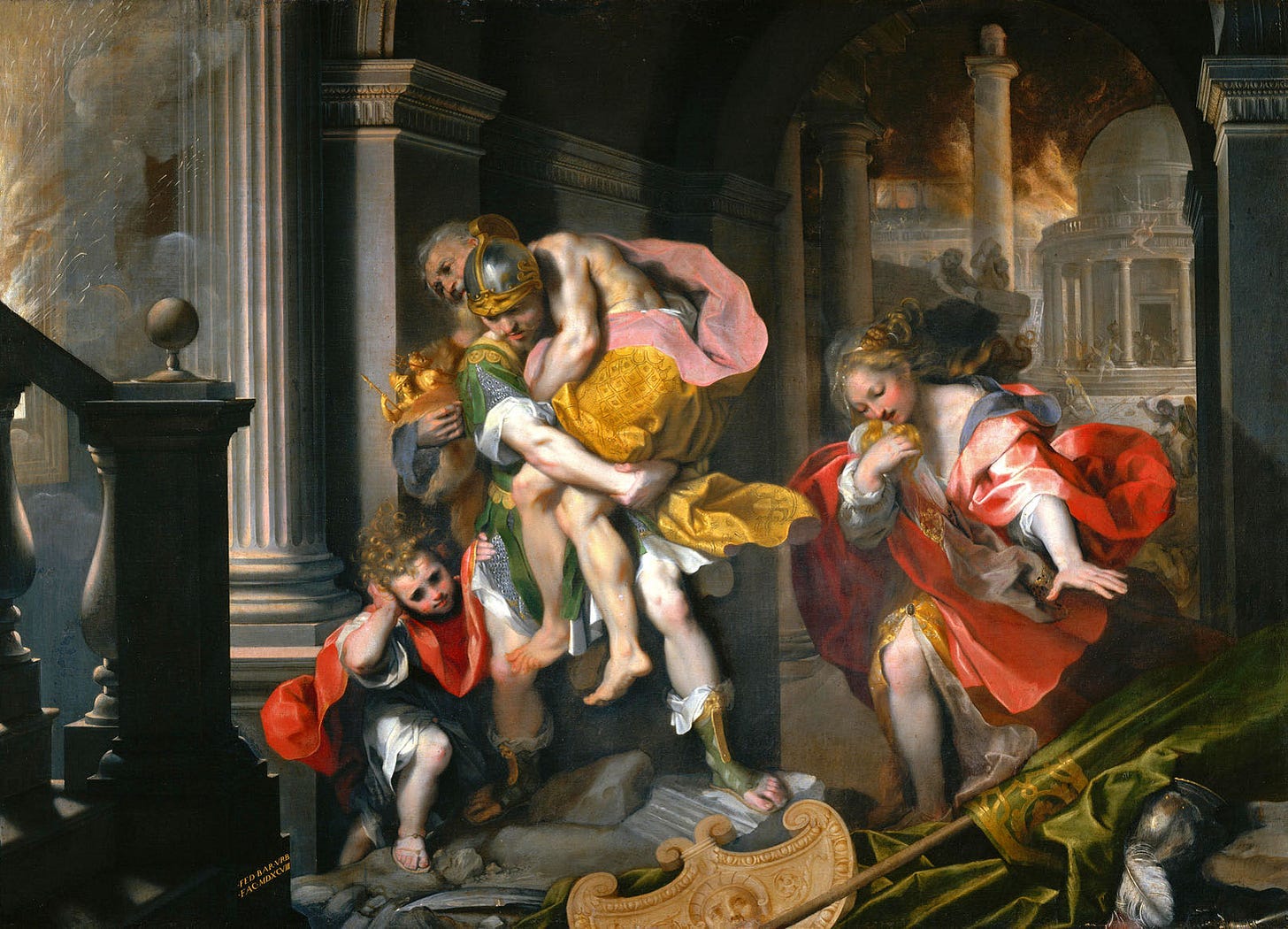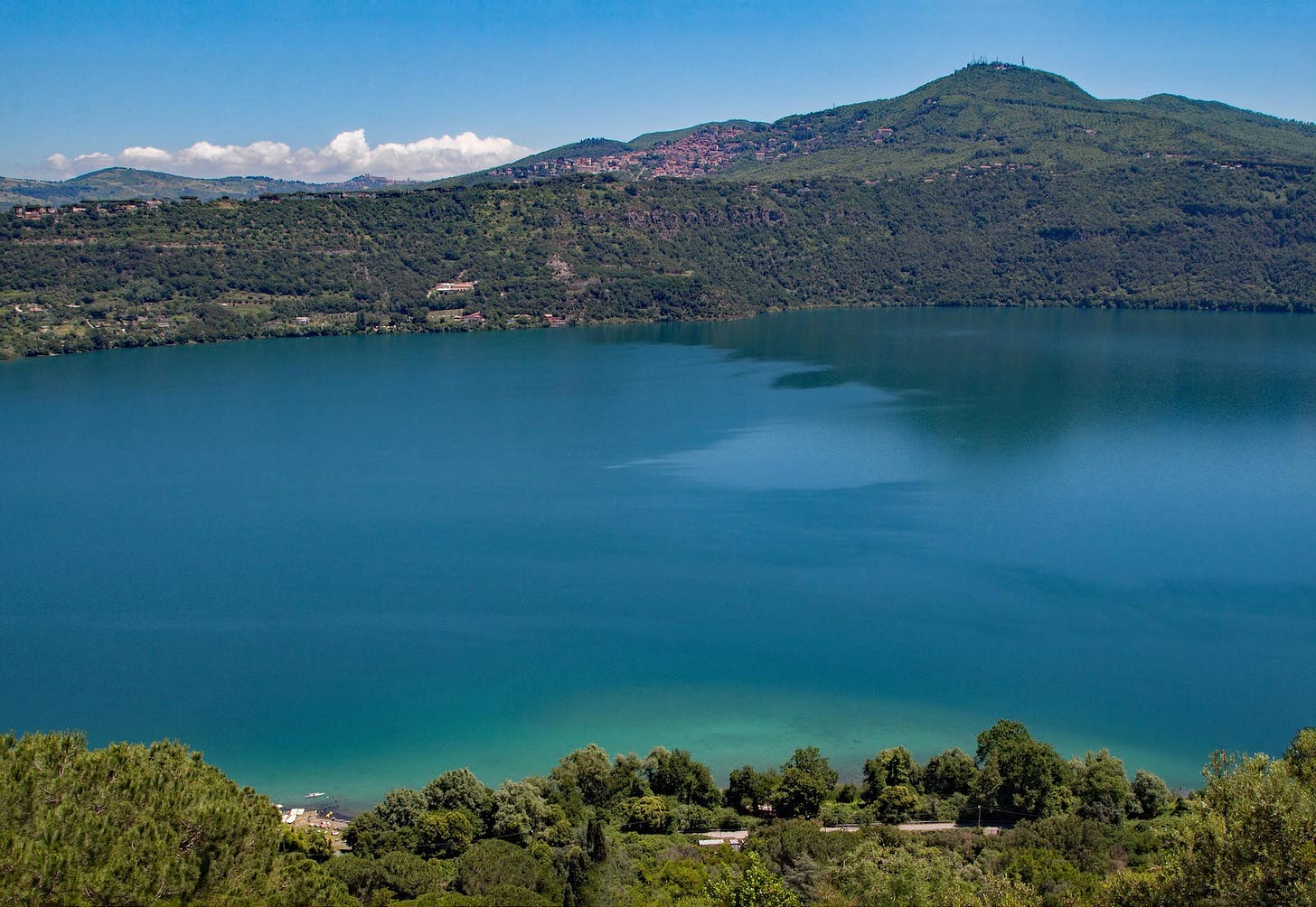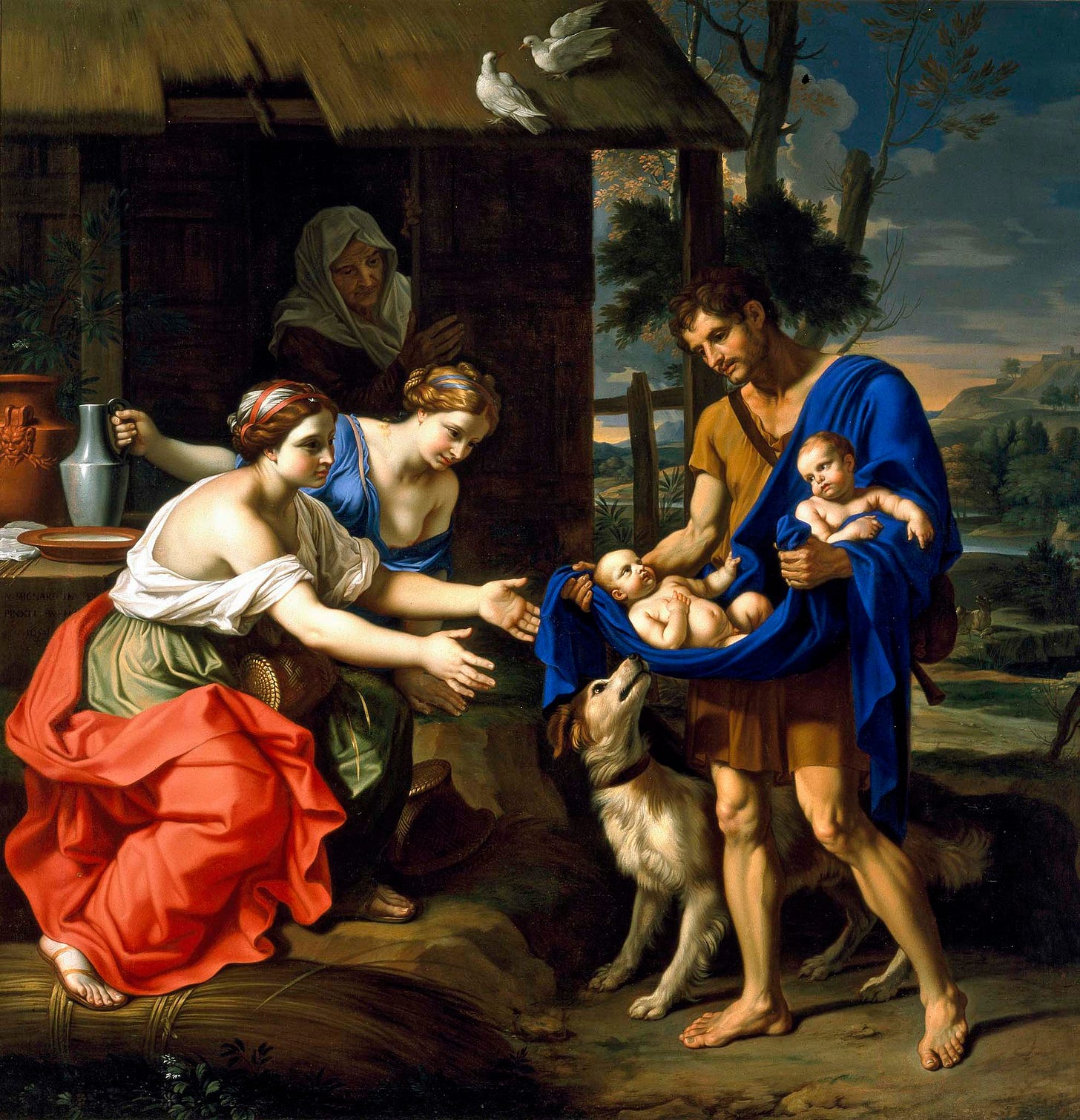“Go tell the Romans, that the gods so will, that my Rome shall become the capital of the world…”
The vision of Romulus to Proculus Julius, Livy, Ab Urbe Condita, I.16
There have been many men who have ‘shaped the course of history’, as we are fond of describing it. We might readily, and rightly, cite Alexander, Caesar or Bonaparte as examples of just such men.
Yet all of them follow in the wake of the man who not only changed, but set the very course of Western history.
For without Romulus there would have been no Rome, in spirit or in name, since it was he who founded the city of all the cities of the West, and gave to her his very name. And if there had been no Rome — the seat of empire and the cradle of Western Christendom thereafter — then the world today would be so far removed from its present form as to be entirely inconceivable.
Man or myth, or man and myth, Romulus forms that extraordinary bridge between the age of heroes and the age of history. Though a man the Romans believed ascended to godhood itself, his life is unambiguously anchored to a single specific date and irrefutable event in our past — the 21st April 753 BC, the foundation of Rome.
In honor of the anniversary of its founding this week, here is the story of how the greatest city on Earth came into being. For if you want to understand the Romans, you must first understand what they believed about themselves — and how that belief allowed them to transform a humble collection of huts into the benchmark of all earthly glory…
The House of Dardanus
It was believed that the destiny of Rome had been decreed by the sovereign of Heaven centuries before her founding. Indeed the foremost epic in the Latin language, The Aeneid of Virgil, takes this mighty prologue as its central narrative.
When the Achaeans laid siege to Troy, and when by cunning they seized her walls and by wrath burned her citadel, there was among the Trojans a prince — Aeneas — who guided the survivors of that vanquished city into exile. The son of Anchises and Aphrodite, Aeneas was of the royal line of Dardanus, sire of all the kings of Troy and the first mortal ancestor of Romulus.
For seven long years Aeneas guided the Trojan remnant across the Mediterranean, before settling at last in the great western land the Greeks called Hesperia, and we today call Italy. Welcomed there by Latinus, king of the Aborigines, the Trojans settled Latium of old. To bind this friendship of peoples, Aeneas wed the king’s daughter Lavinia.
But Turnus, Prince of the Rutuli and the man to whom Lavinia had once been betrothed, made war on the exiles. When Latinus fell, Aeneas slayed Turnus in single combat and united his brethren with the Aborigines into a single nation henceforth called the Latins. He then founded a city, naming her Lavinium in honour of his bride.
Yet soon after the passing of Aeneas, Lavinium swelled to squalor by the weight of her inhabitants, and thus Ascanius his son and heir would found a new city on the ridge of the Alban caldera, a city called Alba Longa. There he would be succeeded by a son who was born in the forest and thence called Silvius (Latin for “forest”). For four hundred years the Sylvian kings that followed him would reign over Alba Longa, and raise her to greatness.
It was as Zeus had foretold, when Aphrodite the mother of Aeneas implored the king of the Olympian gods to watch over her son on Earth:
“Thy son in Italy shall wage vast war
and quell its nations wild; his city-wall
and sacred laws shall be a mighty bond
about his gathered people. Summers three
shall Latium call him king; and three times pass
the winter o'er Rutulia's vanquished hills.
His heir, Ascanius, now Iulus called,
full thirty months shall reign, then move the throne
from the Lavinian citadel, and build
for Alba Longa its well-bastioned wall.
Here three full centuries shall Hector's race
have kingly power; till a priestess queen,
by Mars conceiving, her twin offspring bear…”Virgil, The Aeneid, I. 254
Such was the heroic lineage of the royal house of the Romans...
The Overthrow of Numitor
Eleven generations after the reign of Silvius, Proca bequeathed the kingship of Alba Longa to his two sons, Numitor and Amulius, declaring that the royal dignity would pass from one brother to the other at the dawn of each new year.
Yet Amulius, malevolent and treacherous, seized the throne and cast Numitor aside. Moving quickly to secure the usurpation, Amulius, too cunning to reveal his cruelty openly, kept his brother alive as a puppet, yet arranged a deadly ambush that claimed the life of Aegestes his son. Decrying the callous evil of chance robbery, the people of Alba Longa he thus deceived, before turning his dark genius on his final foe.
With Aegestes gone, there remained but one heir of Numitor — his daughter Rhea Silvia. So Amulius, discarding the risk of further murder, instead proclaimed a great honour to be bestowed upon her, enrolling her as a priestess to the goddess Vesta. As the holiest calling for a woman of pagan Italy, it appeared an act of generous piety. Well, however, did Amulius know that the servants of Vesta were sworn by sacred oath to perpetual virginity. The line of Numitor would thus be broken, and that of Amulius guaranteed.
Providence, however, has ways of humbling the hubris of men, and four years after overthrow of Numitor, Rhea Silvia returned from a grove in the forest with child. Some say she was ravished, others that her beauty had drawn the passion of Mars himself, the deity of war. Whether the father was mortal or immortal, when the months passed, and the belly of Rhea swelled with future kingship, Amulius was seized with rage tinged with fear. For he had learned of an oracle that foretold his own death at the hands of Numitor’s offspring.
When Rhea Silvia then gave birth to twin boys, Amulius would have killed her there and then, citing the ultimate penalty for a Vestal Virgin found inchaste — but his own daughter, Antho, interceded with him, begging him to spare the life of her cousin. In rare mercy therefore, Amulius confined Rhea Silvia to prison.
But with the oracle bearing upon him, the usurper ordered his men to cast the prisoner’s infants, once born, into the river that ran some twenty miles to the south of the city. It was a river named for the Alban King Tiberinus, who long ago had drowned in its fickle waters…
The She-Wolf & the Swineherd
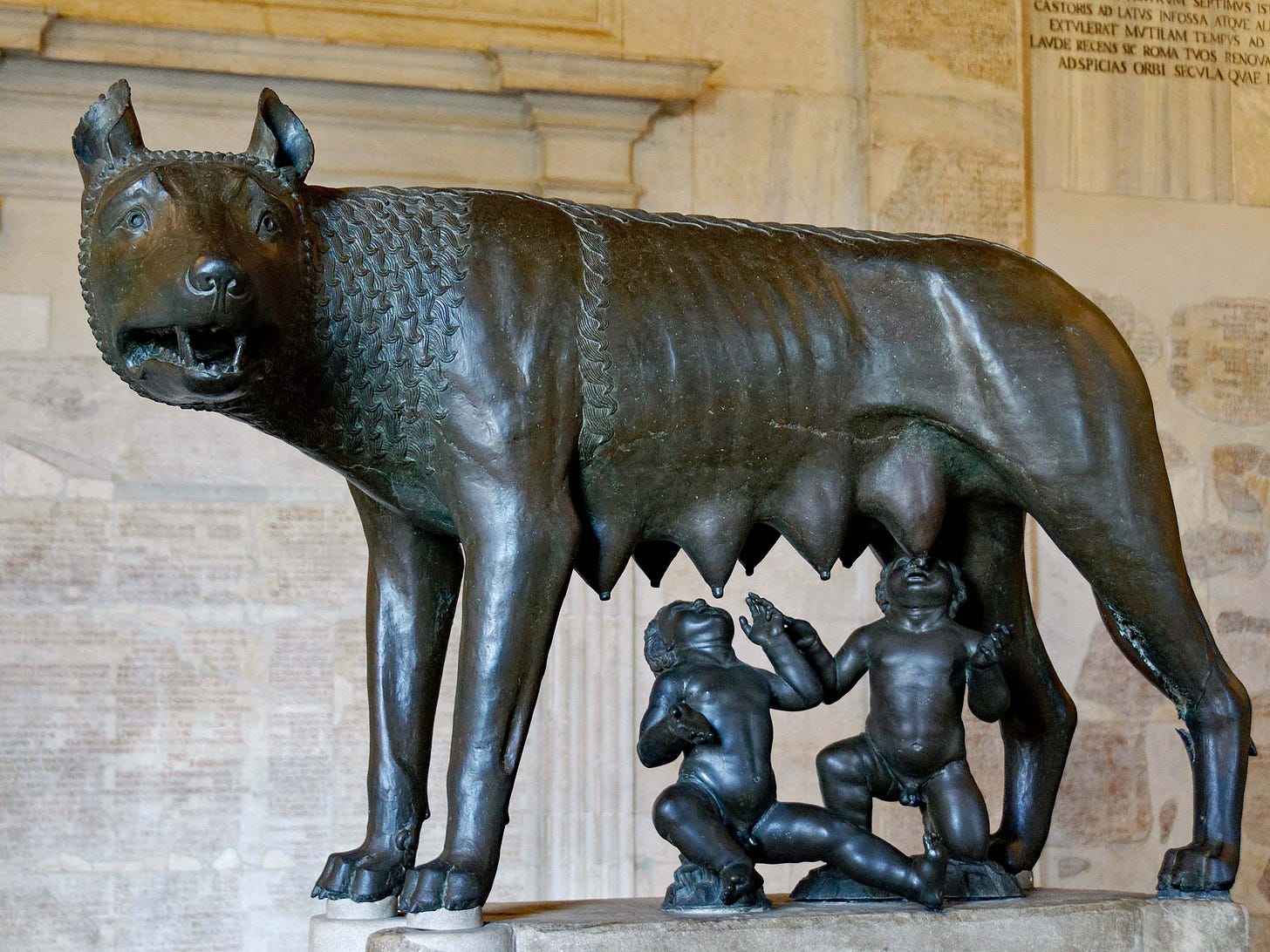
Nearing the banks of the Tiber, the servants of Amulius grew fearful of its raging torrents, which lashed the foot of the hill that would one day be called Palatine. Trusting in the tempest to do their unholy work for them, they set the twins in a trough and laid it beside the floodwaters, before withdrawing to the heights.
Where their courage failed, however, Providence again prevailed, as the waters bore the trough to a gentle slope beneath a lone fig tree. It was then that a she-wolf, udders thick with milk, heard the cries of the infants, and her wild ferocity was conquered by maternal pity. Standing over them, she licked the mud from their foreheads, and gave them a mother’s sustenance. So too a woodpecker flew down from the fig, berries clasped in its beak for the babes, while its sharp eyes kept vigilance.
Stunned by this tender scene and the gentleness of the beasts was a man who had braved the floodwaters — a swineherd of Amulius, or else the driver of the king’s flocks. Faustulus, as he was called, stood transfixed with wonder, before he too took pity on the infants, and bore them to his homestead and the care of his wife Acca Larentia.
One of the boys, seeing his natural strength — ῥώμη, ‘Rhome’ in old Greek — they called Romulus. The other, whose more sluggish bearing, typical of men the Latins called remores, they called Remus…
The Sons of Mars
For eighteen years Romulus and Remus, the sons of gods and kings, were thus raised the sons of shepherds, tempering their royal spirit with the simplicity of the fields and the forest:
“Well, the noble size and beauty of their bodies, even when they were infants, betokened their natural disposition; and when they grew up, they were both of them courageous and manly, with spirits which courted apparent danger, and a daring which nothing could terrify. But Romulus seemed to exercise his judgement more, and to have political sagacity, while in his intercourse with their neighbours in matters pertaining to herding and hunting, he gave them the impression that he was born to command rather than to obey”
Plutarch, Life of Romulus, 6
Faustulus, well acquainted with Alba Longa, the ire of Amulius and the forbidden maternity of Rhea Silvia, feared the discovery of his adoptive sons. So out of prudence, he concealed from the boys the truth he suspected of their parentage. Yet as they grew in age and their bodies in strength, the more destiny took ahold of their deeds.
Keep reading with a 7-day free trial
Subscribe to INVICTUS to keep reading this post and get 7 days of free access to the full post archives.

